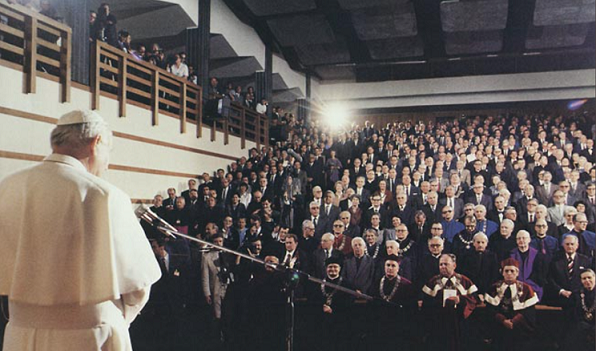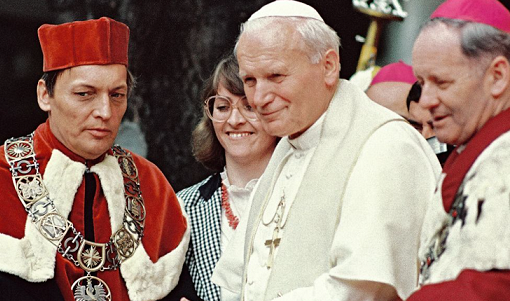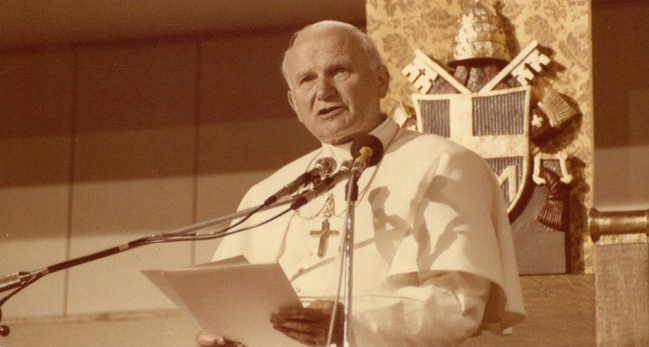Poland: 1700 professors appeal for truth and respect in remembering John Paul II


Twitter @KUL_Lublin
1700 professors signed an appeal for truth and respect in remembering John Paul. II. They appealed to end the dissemination of lies about the Polish pope. The appeal was signed by Adam Daniel Rotfeld, Hanna Suchocka, Krzysztof Zanussi, rectors of universities, world-renowned experts and former ministers, among others.
The appeal reads that professors, researchers and lecturers, are obligated to seek and convey the truth. They also feel co-responsible for it as citizens, because truth is the foundation of public debate.
The document is a response to allegations levelled against John Paul II. Accusations against the Polish pope mounted following the publication of the “Report on the Holy See’s Institutional Knowledge and Decision-Making Related to Former Cardinal Theodore Edgar McCarrick” by the Vatican. The professors underscored that a careful analysis of the report does not point to any facts that could constitute a basis for levelling accusations against John Paul II.
The letter highlights the difference between approving crimes and making wrong personal decisions based on incomplete knowledge or untrue information. It goes on to say that Theodore McCarrick was trusted by many eminent persons, including U.S. presidents, while being able to hide deeply the dark criminal side of his life.
The professors are opposed to smearing emotionally, groundlessly or out of ideological motivation of people’s images, including the Polish pope’s.

Twitter @KUL_Lublin/Kazimierz Fałowski
In addition, the professors underscored that Saint John Paul II had exerted a positive influence on the history of the world, in a global dimension, he was an important advocate of the idea of freedom of individuals and peoples. “John Paul II played a major role in the process of liberation of nations of Central and Eastern Europe from under the Soviet Union’s domination; he was the spiritual leader of Poles during the “Solidarity” and martial law periods. (…) For Catholics, he was an example of the sanctity of life, and for many followers of other religions and non-believers, he was an inspiration and an important reference point (…) John Paul II had often demonstrated the courage to engage in ground-breaking acts, always building unity and healing historical divisions. Examples include: his visit to a synagogue in Rome in 1986, inviting representatives of the world’s major religions to common prayer in Assisi, confessing the sins of the Catholic Church in 2000. Another grand gesture, especially important for us, was the rehabilitation of Galileo, which the pope had anticipated as early as in 1979 (…),” reads the appeal by professors.
The professors appeal to all people of good will to come to their senses. They note that everyone deserves to be talked about honestly, including John Paul II.
The appeal and the list of signatories are on the website of Katolicka Agencja Informacyjna (Catholic Information Agency):
https://ekai.pl/apel-ludzi-nauki-o-prawde-i-szacunek-w-pamieci-o-janie-pawle-ii/
The appeal continues. If other lay persons holding the title of professor (titular professors and university professors) wish to sign the appeal, they can do so by writing to this e-mail address: apelprofesorow@gmail.com stating their academic title and the name of their university.
The letter has been signed by professors from several dozen universities and research institutes. “It is an unprecedented event, one which has brought together academic communities and exceeded our wildest expectations,” the initiative’s organizers have underscored.

Twitter @Bibl_CyfrowaKUL
Here is the full text of the letter:
The signatories of this letter are people who work at Polish universities and research institutes. In our scientific and didactic work, we are obligated to seek the truth and to demonstrate it to our students. As citizens, we also feel co-responsible for truth as a foundation of public debate.
In the last few days, we have been witnessing a wave of accusations levelled against John Paul II. He is accused of covering up pedophile acts among Catholic priests and there are calls for the removal of his public memorials. These acts are intended to transform the image of a person worthy of the highest esteem into one who was complicit in abhorrent crimes. A pretext for making radical demands was the publication of “Report on the Holy See’s Institutional Knowledge and Decision-Making Related to Former Cardinal Theodore Edgar McCarrick” by the Holy See. However, a careful analysis of the report does not point to any facts that could constitute a basis for levelling the above-mentioned accusations against John Paul II.
There is a huge gap between promoting one of the most serious offences and making wrong staffing decisions due to inadequate knowledge or outright false information. The said Theodore McCarrick was trusted by many eminent persons, including U.S. presidents, while being able to hide deeply the dark criminal side of his life. All this leads us to assume that slander and unsourced attacks against the memory of John Paul II are motivated by a preconceived theory which sadden and deeply concern us. As people involved in science, we understand the need to carefully investigate the biographies of outstanding historical figures. However, balanced reflection and honest analysis have nothing in common with an emotional and not based on any rational premises or ideologically motivated image.
John Paul II exerted a positive influence on the history of the world, in a global dimension, he was an important advocate of the idea of freedom of individuals and peoples. In his address to the participants of the UN General Assembly on 5 October 1995, John Paul II said:
“Freedom is a measure of man’s dignity and greatness. Life in conditions of freedom that both individuals and nations aspire to, is a great opportunity for the spiritual development of individuals and the moral revival of nations.”
John Paul II played a major role in the process of liberation of nations of Central and Eastern Europe from under the Soviet Union’s domination; he was the spiritual leader of Poles during the “Solidarity” and martial law periods. Many Poles regarded him as a great authority also in later years. The teaching of the Polish Pope contained ideas that many citizens of the Republic of Poland considered decisive during the referendum confirming Poland’s accession to the European Union. Thanks to John Paul II, Polish history and culture in its best manifestations became known worldwide. He spoke powerfully to crowds and at the same time exerted an indelible influence on people who came into direct contact with him. For Catholics, he was an example of the sanctity of life, and for many followers of other religions and non-believers, he was an inspiration and an important reference point.
John Paul II had often demonstrated the courage to engage in ground-breaking acts, always building unity and healing historical divisions. Examples include: his visit to a synagogue in Rome in 1986, inviting representatives of the world’s major religions to common prayer in Assisi, confessing the sins of the Catholic Church in 2000. Another grand gesture, especially important for us, was the rehabilitation of Galileo, which the Pope had anticipated as early as in 1979 during a solemn remembrance of Albert Einstein on the centennial of his birth. This rehabilitation, carried out at the request of John Paul II by the Pontifical Academy of Sciences thirteen years later, was a symbolic recognition of the autonomy and importance of scientific research. As its initiator stressed: “The case of Galileo can become a lesson also for us, useful in analogous situations, which exist today or may arise in the future.”
An impressive long list of John Paul II’s merits and accomplishments is being challenged and erased today. For young people, who were born after his death, the deformed, false and belittled image of the Pope could become the only one they will know.
We appeal to all people of good will to come to their senses. John Paul II, like every other person, deserves to be talked about honestly. By defaming and rejecting John Paul II, we do great harm to ourselves, not to him. In this way we are saying that we have no respect for the historical accomplishments and the brightest pages of our modern history. If this way of treating them is not stopped, then with time we will only have be aware of the defeats and shame of the Republic of Poland, a picture that is fundamentally false, but with all of its consequences. And the most serious one will be the belief of the next generation that there is no reason why a community with such a past should be sustained.




Dodaj komentarz